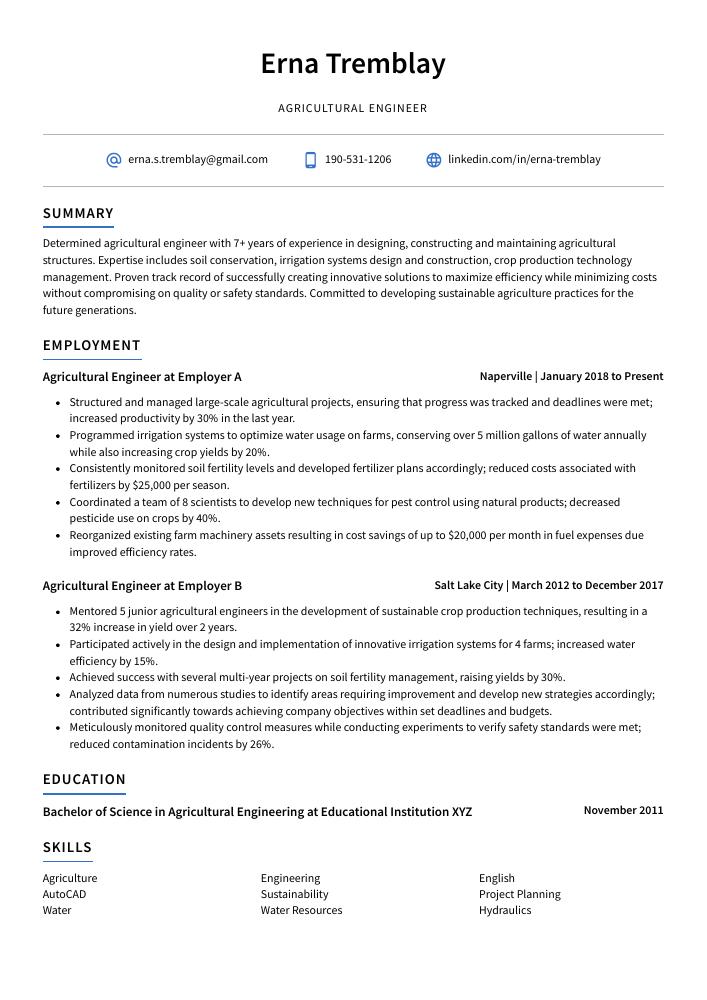Agricultural Engineer Resume Guide
Agricultural engineers design and develop new technologies for farming and agricultural production. They work with farmers to find solutions to problems related to soil, water, crops, machinery, structures, livestock and other aspects of the farm environment. They use their knowledge of engineering principles along with biology and chemistry in order to make improvements that help increase crop yields or reduce costs associated with running a farm operation.
Your expertise in agricultural engineering puts you at the top of your field. However, potential employers don’t know who you are yet. To make them aware of all that you can do for their organization, a well-written resume is essential.
This guide will walk you through the entire process of creating a top-notch resume. We first show you a complete example and then break down what each resume section should look like.
Table of Contents
The guide is divided into sections for your convenience. You can read it from beginning to end or use the table of contents below to jump to a specific part.
Agricultural Engineer Resume Sample
Erna Tremblay
Agricultural Engineer
erna.s.tremblay@gmail.com
190-531-1206
linkedin.com/in/erna-tremblay
Summary
Determined agricultural engineer with 7+ years of experience in designing, constructing and maintaining agricultural structures. Expertise includes soil conservation, irrigation systems design and construction, crop production technology management. Proven track record of successfully creating innovative solutions to maximize efficiency while minimizing costs without compromising on quality or safety standards. Committed to developing sustainable agriculture practices for the future generations.
Experience
Agricultural Engineer, Employer A
Naperville, Jan 2018 – Present
- Structured and managed large-scale agricultural projects, ensuring that progress was tracked and deadlines were met; increased productivity by 30% in the last year.
- Programmed irrigation systems to optimize water usage on farms, conserving over 5 million gallons of water annually while also increasing crop yields by 20%.
- Consistently monitored soil fertility levels and developed fertilizer plans accordingly; reduced costs associated with fertilizers by $25,000 per season.
- Coordinated a team of 8 scientists to develop new techniques for pest control using natural products; decreased pesticide use on crops by 40%.
- Reorganized existing farm machinery assets resulting in cost savings of up to $20,000 per month in fuel expenses due improved efficiency rates.
Agricultural Engineer, Employer B
Salt Lake City, Mar 2012 – Dec 2017
- Mentored 5 junior agricultural engineers in the development of sustainable crop production techniques, resulting in a 32% increase in yield over 2 years.
- Participated actively in the design and implementation of innovative irrigation systems for 4 farms; increased water efficiency by 15%.
- Achieved success with several multi-year projects on soil fertility management, raising yields by 30%.
- Analyzed data from numerous studies to identify areas requiring improvement and develop new strategies accordingly; contributed significantly towards achieving company objectives within set deadlines and budgets.
- Meticulously monitored quality control measures while conducting experiments to verify safety standards were met; reduced contamination incidents by 26%.
Skills
- Agriculture
- Engineering
- English
- AutoCAD
- Sustainability
- Project Planning
- Water
- Water Resources
- Hydraulics
Education
Bachelor of Science in Agricultural Engineering
Educational Institution XYZ
Nov 2011
Certifications
Certified Professional Agronomist
American Society of Agronomy
May 2017
1. Summary / Objective
A resume summary/objective is like a preview of your skills and experience. It should be concise yet compelling, giving the hiring manager an overview of why you are the best candidate for the agricultural engineer position. In this section, you could mention your expertise in developing innovative irrigation systems, designing efficient crop storage solutions, or leading successful research projects related to soil health. You can also include any certifications or awards that demonstrate your commitment to excellence in agriculture engineering.
Below are some resume summary examples:
Accomplished agricultural engineer with 5+ years of experience in developing, implementing, and managing projects related to the production and utilization of food products. Expertise in agro-chemical formulations for crop protection against pests and diseases. Highly proficient at conducting research on new technologies for improving water management systems. At XYZ Farm achieved a 71% reduction in water usage by introducing innovative irrigation technology solutions.
Detail-oriented agricultural engineer with 8+ years of experience in sustainable agricultural practices, soil science and water management. Skilled in developing comprehensive farm plans that optimally utilize resources to increase yields. Achieved a 35% improvement in crop yield for Company X by implementing innovative irrigation techniques. Seeking to join ABC Farm as an Agricultural Engineer and help maximize productivity while maintaining sustainability goals.
Passionate agricultural engineer with a focus on crop production, soil health and water management. Experienced in designing cost-effective farming systems to increase yields while preserving the environment. At XYZ Farm, implemented an automated irrigation system that increased yield by 18% without increasing labor costs or energy usage. Proven record of success in developing innovative solutions for sustainable agriculture projects across multiple countries.
Well-rounded agricultural engineer with 5+ years of experience in crop production and soil management. At XYZ, led the development of a precision farming system which reduced fertilizer costs by 60%. As team leader at ABC Inc., developed an advanced irrigation control system which increased water efficiency by 40%, saving $1 million annually. Adept at leading projects from concept to completion while ensuring quality assurance and regulatory compliance.
Professional agricultural engineer with 10+ years of experience in designing, implementing and managing innovative agricultural projects. Proven ability to design efficient irrigation systems, develop sustainable crop production methods, and optimize farm operations for cost-effectiveness. Seeking a position at ABC Solutions to leverage expertise in developing long-term solutions that improve the quality of life in rural communities.
Seasoned agricultural engineer skilled in developing and implementing efficient agricultural systems for large scale operations. Experienced in setting up irrigation, drainage, and other land management systems to ensure optimal crop yield. Proven track record of working with farmers to improve their processes and maximize profit through innovative solutions. Looking forward to bringing my expertise to the table at XYZ Corporation.
Hard-working agricultural engineer with 4+ years of experience in engineering and agricultural processes. Extensive knowledge of irrigation systems, crop development plans, soil analysis procedures and farm management strategies. Proven track record in designing efficient farming networks that have helped improve the productivity of multiple farms by 25%. Seeking to leverage my expertise as an Agricultural Engineer at ABC Farm.
Enthusiastic and knowledgeable agricultural engineer with 7+ years of experience developing efficient solutions to improve crop yields and reduce environmental impact. Track record of success in designing, installing, testing, and maintaining a variety of farming systems for clients across the US. Ready to join ABC AgroTech as an Agricultural Engineer and apply my expertise towards helping them become industry leaders.
2. Experience / Employment
In the experience/employment/work history section, you should list your roles in reverse chronological order. That means the most recent job is listed first.
When writing out what you did, stick to bullet points primarily; this makes it easier for the reader to take in the information quickly and efficiently. When stating what you did, be sure to provide detail that explains how you achieved results or made an impact on a project/company.
For example, instead of saying “Developed irrigation systems,” you could say, “Designed automated irrigation system for local farm which resulted in 20% increase in crop yield.”
To write effective bullet points, begin with a strong verb or adverb. Industry specific verbs to use are:
- Designed
- Constructed
- Analyzed
- Monitored
- Cultivated
- Irrigated
- Harvested
- Operated
- Inspected
- Installed
- Programmed
- Supervised
- Managed
- Coordinated
- Optimized
Other general verbs you can use are:
- Achieved
- Advised
- Assessed
- Compiled
- Demonstrated
- Developed
- Expedited
- Facilitated
- Formulated
- Improved
- Introduced
- Mentored
- Participated
- Prepared
- Presented
- Reduced
- Reorganized
- Represented
- Revised
- Spearheaded
- Streamlined
- Structured
- Utilized
Below are some example bullet points:
- Improved crop yields by 20% through the development and implementation of innovative soil management techniques.
- Advised farmers on best practices in sustainable agricultural production, helping to reduce water usage by 35%.
- Presented research findings at national conferences on topics related to irrigation systems and crop rotation strategies; received accolades from industry experts for work in this area.
- Accurately identified problems with existing farming equipment, saving up to $20,000 worth of repairs over a 3-month period due to timely intervention & maintenance recommendations given priorly.
- Expedited the harvesting process through automation initiatives that reduced labor costs by 10 hours per week while ensuring higher quality control standards were met consistently.
- Reduced overall agricultural costs by 15% through the implementation of innovative irrigation, fertilization and pest control systems.
- Revised existing farming methods to increase crop yield by 30%, resulting in an annual profit growth of $20,000+.
- Confidently managed a team of 8-10 farm staff members while ensuring that all tasks were completed on schedule and within budget constraints.
- Operated a variety of heavy machinery such as tractors and harvesters with precision accuracy; routinely inspected equipment for safety hazards or malfunctions before use.
- Compiled detailed reports summarizing field data related to soil fertility, water availability and environmental impact; analyzed results to identify areas requiring improvement or further study.
- Prepared detailed plans and designs for over 25 agricultural projects, increasing production output by 30% in the last quarter.
- Assessed soil conditions to determine optimal irrigation techniques and fertilization processes; improved crop health resulting in a 15% increase of yield per acre on average.
- Harvested grains from multiple fields with precision accuracy using state-of-the-art equipment; reduced harvesting time by 10 hours each week during peak season.
- Thoroughly inspected all farm machinery, structures, buildings and other facilities on regular basis to ensure compliance with safety regulations as well as maximum efficiency performance levels; corrected any issues within 24 hours of detection leading to no major breakdowns or accidents occurring throughout 4 years of service at the company.
- Represented the organization at numerous industry trade shows & conferences worldwide while presenting up-to date research findings related to sustainable farming methods & practices; increased brand visibility amongst stakeholders by 40%.
- Demonstrated expertise in agricultural engineering by designing and developing effective irrigation systems for over 100 farms, resulting in a 20% reduction of the total water consumption.
- Installed cutting-edge precision farming technologies to facilitate efficient crop production; successfully automated processes across 500+ acres of farmland.
- Irrigated crops through sustainable methods such as drip systems and furrow irrigation, leading to an increase of 10% in overall yield quality with no additional inputs or resources utilized.
- Optimized land fertility management practices to ensure optimum soil health; reduced fertilizer usage by $3,000 within 6 months while maintaining same harvest quantity & quality standards.
- Substantially increased farm efficiency levels by implementing advanced automation techniques which resulted in 30 hours less labor per month on average.
- Managed and supervised a team of 10 agricultural engineers, designing and implementing efficient water resource management systems that reduced wastage by 35%.
- Monitored the quality of soil, crops and irrigation techniques across 500+ acres of land; identified issues in production process, recommending solutions to improve output by 15%.
- Introduced innovative fertilization methods for increased crop yield and advised on sustainable farming practices for improved sustainability outcomes.
- Successfully designed cost-effective drainage systems which resulted in savings of $14K from yearly budget spending without compromising performance standards.
- Inspected farm equipment regularly to ensure optimal operation levels; drastically lowered repair costs by 25% over 3 years through proactive maintenance activities.
- Utilized precision farming techniques to monitor and analyze soil quality, crop yields and other agricultural conditions; improved overall efficiency by 20%.
- Developed comprehensive plans for the construction of irrigation systems based on specifications given by clients; completed projects within budget while maintaining high quality standards.
- Spearheaded a team of 10 engineers in designing new fertilizers, pesticides and other agrochemicals that increased crop production yields by 30% across all farms serviced.
- Reliably maintained detailed records of livestock health checks, breeding cycles & farm equipment upkeep; reduced animal mortality rates from 8% to 2%.
- Constructed greenhouses with automated climate control systems per customer requests; finished installations before deadlines without compromising safety guidelines or industry regulations.
- Facilitated the implementation of sustainable agricultural practices on 5+ farms, resulting in a reduction in water usage by 40%.
- Designed and constructed irrigation systems for 30 acres of farmland; upgraded existing facilities to improve efficiency by 15%.
- Formulated strategies to increase crop yields through soil analysis and fertilizer selection, achieving an average yield improvement of 10% across all farms.
- Supervised the maintenance team responsible for ensuring farm machinery was running properly; reduced downtime due to repairs by 25 hours per week on average.
- Diligently monitored environmental conditions such as temperature, humidity & soil moisture levels while assessing pest control programs; identified potential issues before they affected crops, leading to cost savings of $8500 annually.
3. Skills
Two organizations that have advertised for a position with the same title may be searching for individuals whose skills are quite different. For instance, one may be looking for someone who has experience with crop production, while the other is searching for an individual with expertise in irrigation systems.
It’s important to tailor your skills section of your resume to each job you are applying for. This will help ensure that applicant tracking systems used by many employers can easily identify relevant keywords and pass on a high-quality match to their human recruiters.
You should also discuss some of these skills in more detail throughout the rest of your resume; this will demonstrate that you have a comprehensive understanding of them and how they are applicable within agricultural engineering roles.
Below is a list of common skills & terms:
- Agribusiness
- Agriculture
- ArcGIS
- AutoCAD
- Engineering
- English
- Environmental Awareness
- Environmental Engineering
- Farms
- GIS
- Hydraulics
- Hydrology
- Maintenance and Repair
- Mechanical Engineering
- Metal Fabrication
- Project Planning
- Soil
- Sustainability
- Sustainable Agriculture
- Water
- Water Quality
- Water Resources
4. Education
Mentioning an education section on your resume depends on how far along you are in your career. If you just graduated and have no prior work experience, list your education below the objective statement. However, if you’ve been working as an agricultural engineer for a while and have plenty of accomplishments to showcase, omitting the education section might be more beneficial.
If including an educational background is necessary, make sure to mention courses or subjects related to the agricultural engineering role that could help demonstrate relevant knowledge and skills.
Bachelor of Science in Agricultural Engineering
Educational Institution XYZ
Nov 2011
5. Certifications
Certifications are an important way to demonstrate your expertise in a certain field. They also show potential employers that you have taken the initiative to stay up-to-date on industry trends and developments.
Including certifications relevant to the job you are applying for can help give hiring managers confidence in your abilities and make them more likely to consider you as a viable candidate.
Certified Professional Agronomist
American Society of Agronomy
May 2017
6. Contact Info
Your name should be the first thing a reader sees when viewing your resume, so ensure its positioning is prominent. Your phone number should be written in the most commonly used format in your country/city/state, and your email address should be professional.
You can also choose to include a link to your LinkedIn profile, personal website, or other online platforms relevant to your industry.
Finally, name your resume file appropriately to help hiring managers; for Erna Tremblay, this would be Erna-Tremblay-resume.pdf or Erna-Tremblay-resume.docx.
7. Cover Letter
A cover letter is an essential part of any job application. It usually consists of 2 to 4 paragraphs and provides additional information that isn’t included in your resume. Most importantly, it gives you the opportunity to explain why you are a great fit for the role and how you can add value to the company.
Although cover letters aren’t always required, writing one is highly recommended as it allows hiring managers to get a more detailed understanding about who you are as a professional. Crafting an effective cover letter can make all the difference when competing with other candidates for the same position!
Below is an example cover letter:
Dear Jett,
I am interested in applying for the Agricultural Engineer position at your company. With a Bachelor’s degree in Agricultural Engineering and 3 years of experience working on farms, I have the skills and knowledge to be a valuable asset to your team.
In my previous role as an Agricultural Engineer at XYZ Farms, I was responsible for designing and implementing irrigation systems, drainage systems, and soil conservation plans. I also oversaw the construction of new farm buildings and the renovation of existing ones. My experience has given me a strong understanding of agricultural principles and how to apply them in a practical way.
I am confident that I can use my skills and experience to contribute to the success of your company. I am eager to put my knowledge to work in order to improve efficiency on your farm and help you meet your production goals.
Thank you for your time and consideration. Please do not hesitate to contact me if you have any questions or would like more information about my qualifications. I look forward to hearing from you soon.
Sincerely,
Erna
Agricultural Engineer Resume Templates
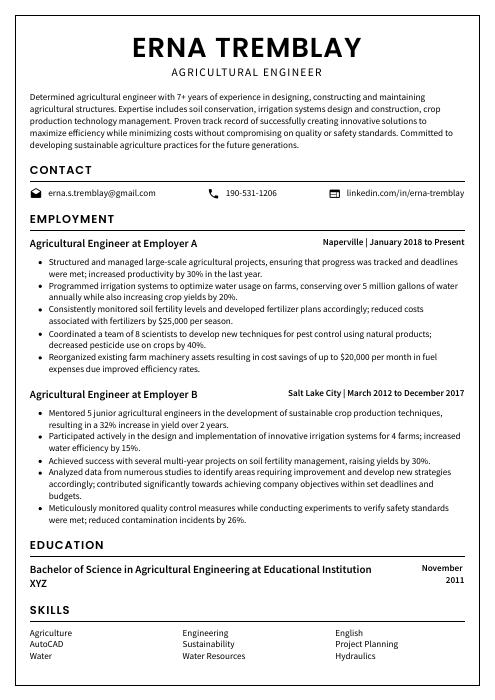 Cormorant
Cormorant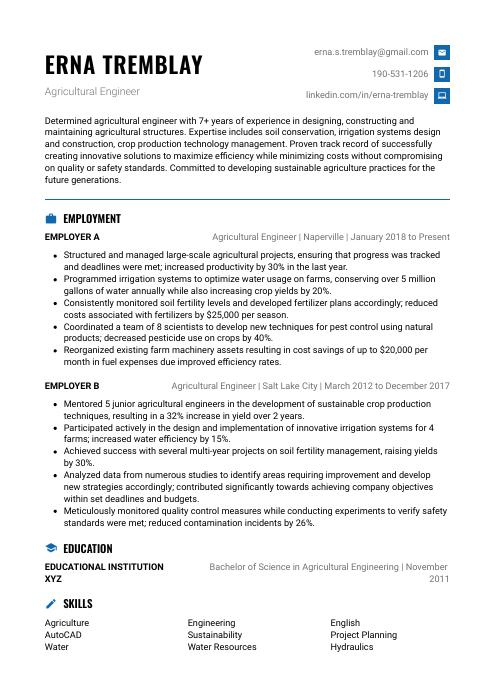 Echidna
Echidna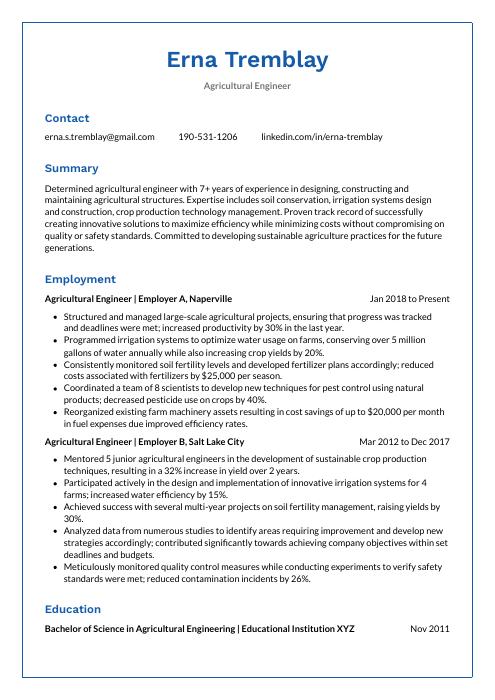 Markhor
Markhor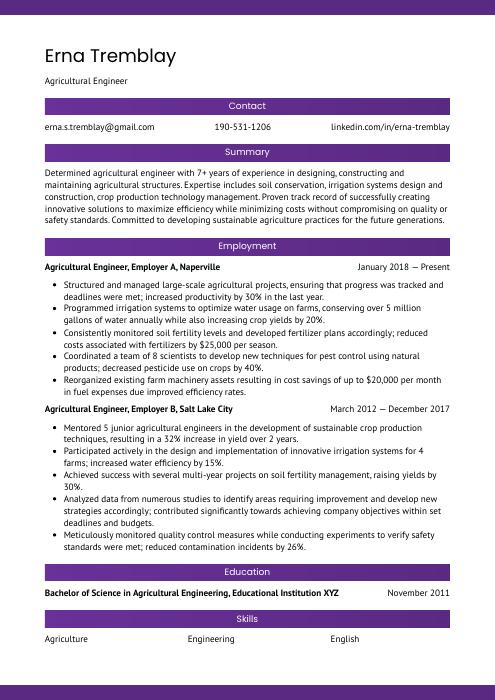 Jerboa
Jerboa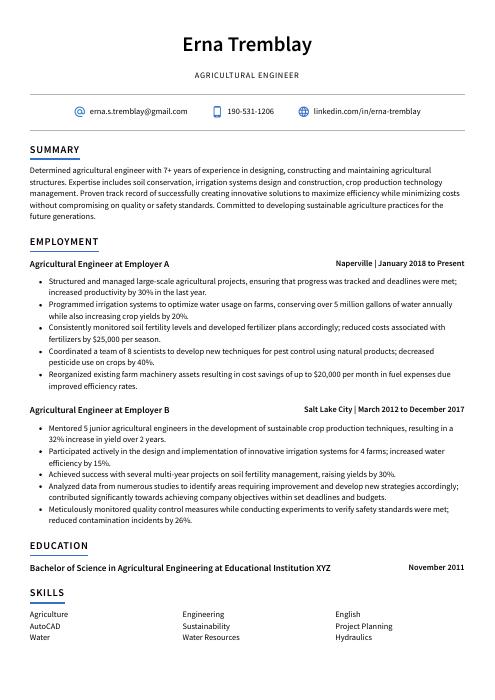 Axolotl
Axolotl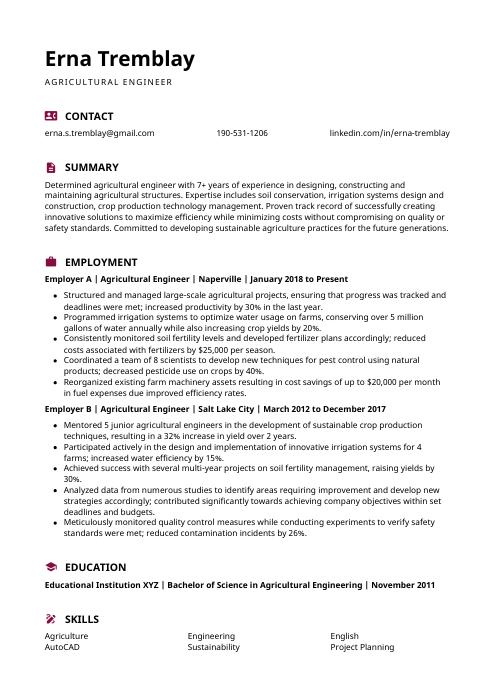 Hoopoe
Hoopoe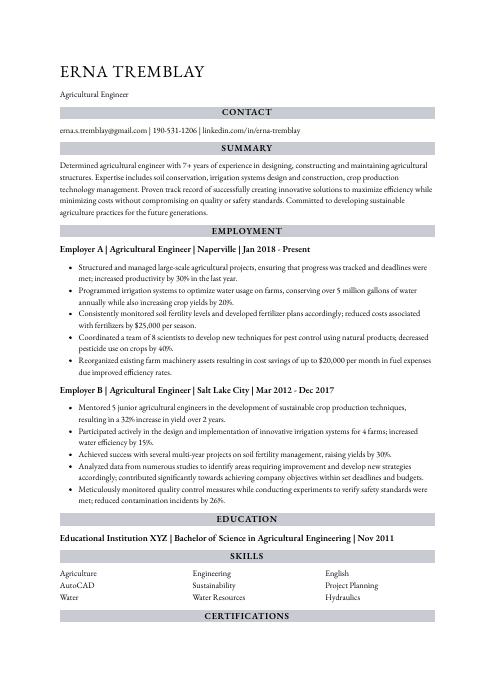 Numbat
Numbat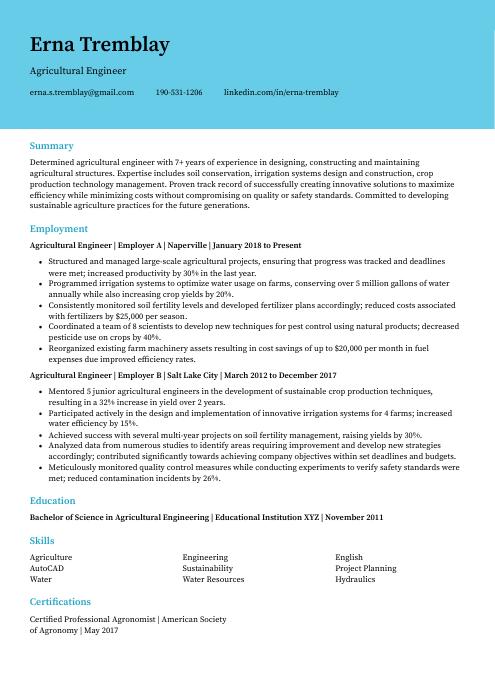 Dugong
Dugong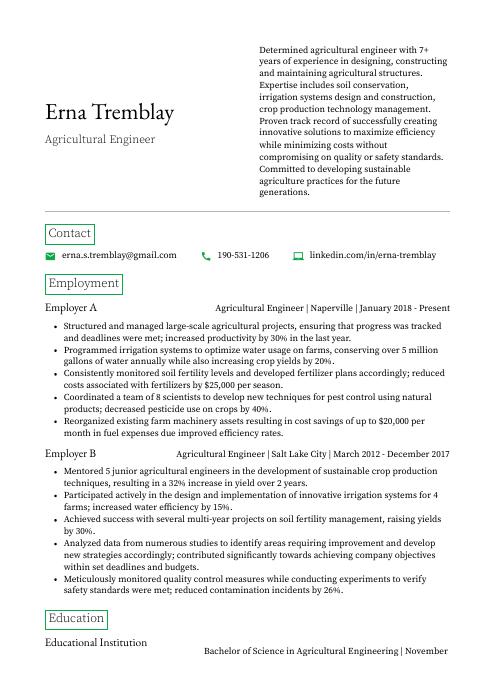 Quokka
Quokka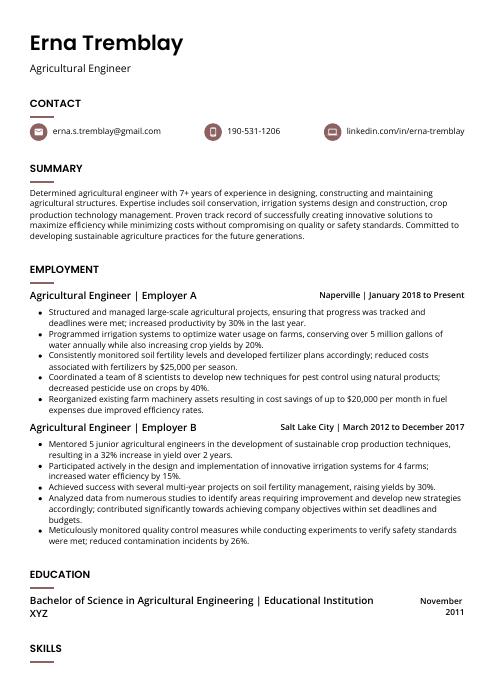 Fossa
Fossa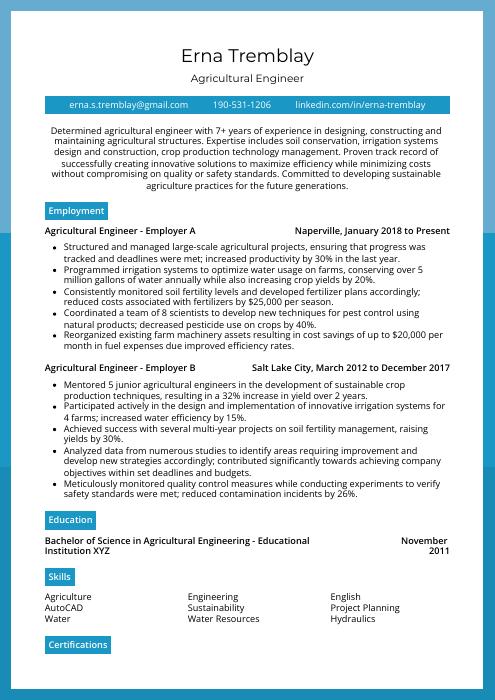 Rhea
Rhea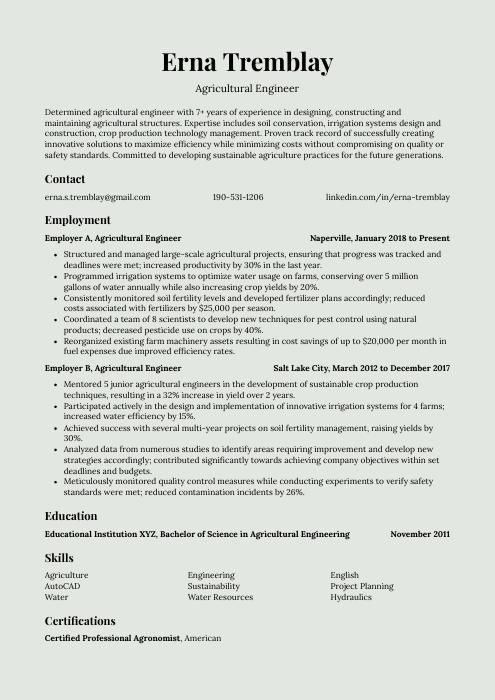 Saola
Saola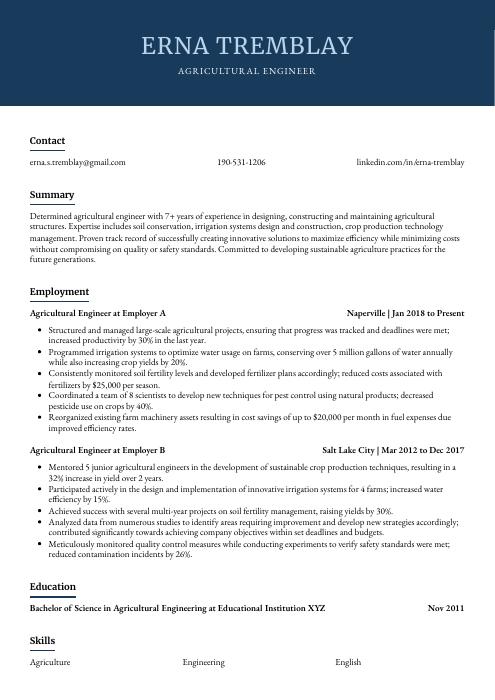 Bonobo
Bonobo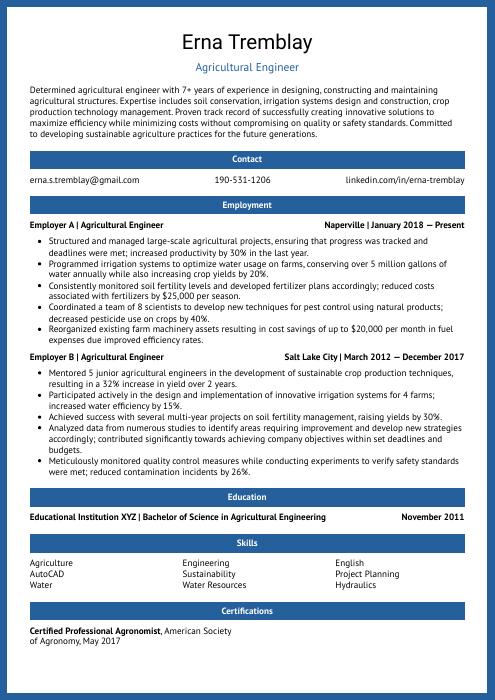 Ocelot
Ocelot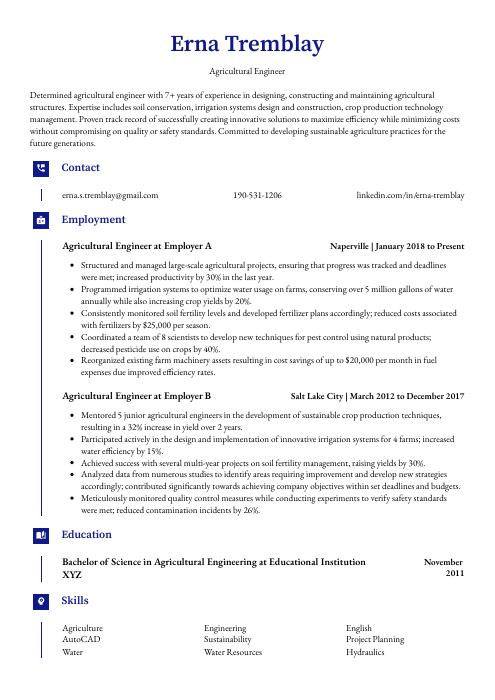 Gharial
Gharial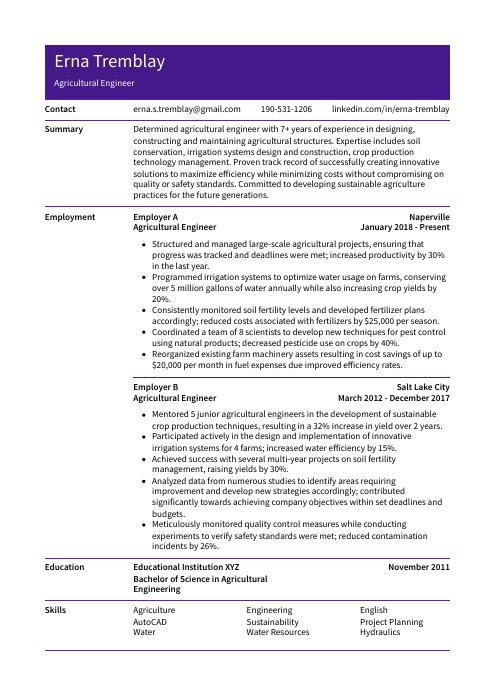 Pika
Pika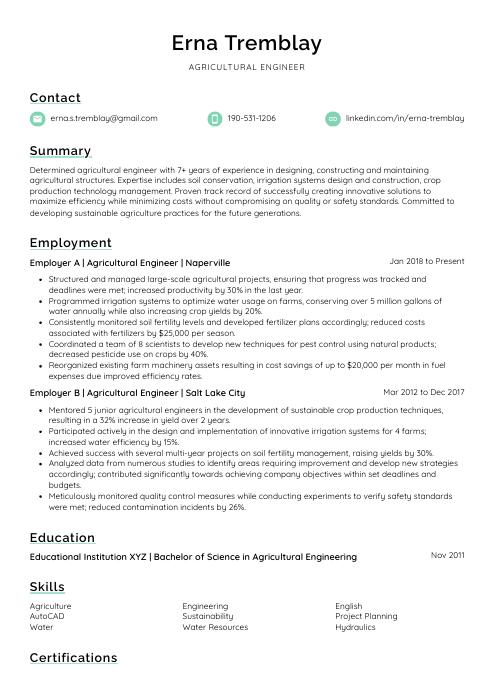 Lorikeet
Lorikeet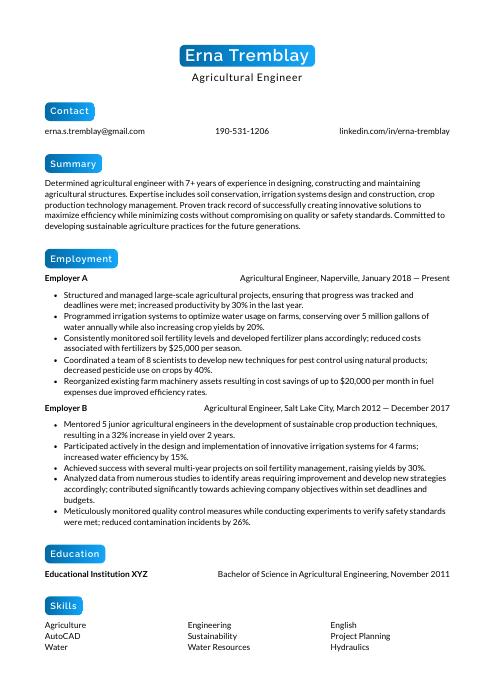 Kinkajou
Kinkajou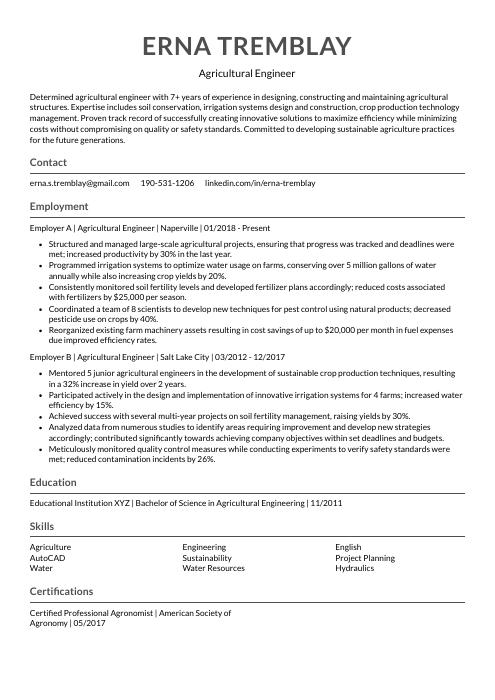 Indri
Indri Rezjumei
Rezjumei
